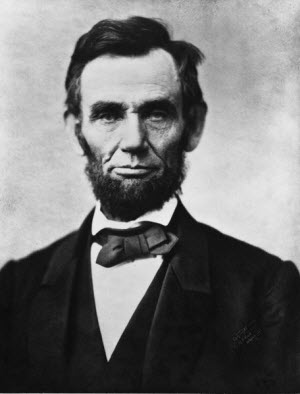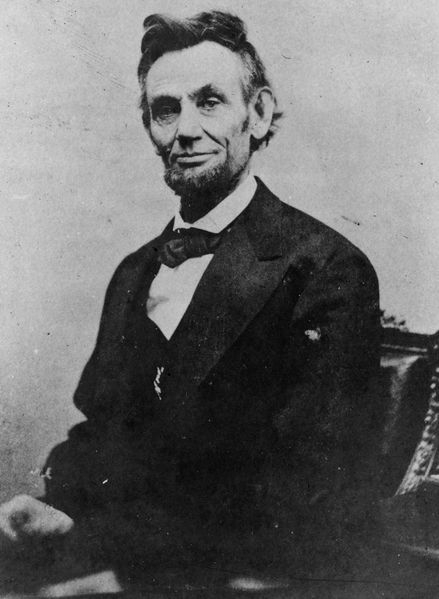At the time of Lincoln's nomination, at Chicago, Mr. Newton Bateman, Superintendent of Public Instruction for the State of Illinois, occupied a room adjoining and opening into the Executive Chamber at Springfield. Frequently this door was open during Mr. Lincoln's receptions, and throughout the seven months or more of his occupation he saw him nearly every day. Often, when Mr. Lincoln was tired, he closed the door against all intruders, and called Mr. Bateman into his room for a quiet talk. On one of these occasions, Mr. Lincoln took up a book containing canvass of the city of Springfield, in which he lived, showing the candidate for whom each citizen had declared it his intention to vote in the approaching election. Mr. Lincoln's friends had, doubtless at his own request, placed the result of the canvass in his hands. This was towards the close of October, and only a few days before election. Calling Mr. Bateman to a seat by his side, having previously locked all the doors, he said:
"Let us look over this book; I wish particularly to see how the ministers if Springfield are going to vote." The leaves were turned, one by one, and as the names were examined Mr. Lincoln frequently asked if this one and that one was not a minister, or an elder, or a member of such and such a church, and sadly expressed his surprise on receiving an affirmative answer. In that manner he went through the book, and then he closed it, and sat silently for some minutes regarding a memorandum in pencil which lay before him. At length he turned to Mr. Bateman, with a face full of sadness, and said:
"Here are twenty-three ministers of different denominations, and all of them are against me but three, and here are a great many prominent members of churches, a very large majority are against me. Mr. Bateman, I am not a Christian--God knows I would be one--but I have carefully read the Bible, and I do not so understand this book," and he drew forth a pocket New Testament.
"These men well know," he continued, "that I am for freedom in the Territories, freedom everywhere, as free as the Constitution and the laws will permit, and that my opponents are for slavery. They know this, and yet, with this book in their hands, in the light of which human bondage cannot live a moment, they are going to vote against me; I do not understand it at all."
Here Mr. Lincoln paused--paused for long minutes, his features surcharged with emotion. Then he rose and walked up and down the reception-room in the effort to retain or regain his self-possession. Stopping at last, he said, with a trembling voice and cheeks wet with tears:
"I know there is a God, and that He hates injustice and slavery. I see the storm coming, and I know that His hand is in it. If He has a place and work for me, and I think He has, I believe I am ready. I am nothing, but Truth is everything. I know I am right, because I know that liberty is right, for Christ teaches it, and Christ is God. I have told them that a house divided against itself cannot stand; and Christ and Reason say the same, and they will find it so.
"Douglas doesn't care whether slavery is voted up or down, but God cares, and humanity cares, and I care; and with God's help I shall not fail. I may not see the end, but it will come, and I shall be vindicated; and these men will find they have not read their Bible right."
Much of this was uttered as if he were speaking to himself, and with a sad, earnest solemnity of manner impossible to be described. After a pause he resumed:
"Doesn't it seem strange that men can ignore the moral aspect of this contest? No revelation could make it plainer to me that slavery or the Government must be destroyed. The future would be something awful, as I look at it, but for this rock on which I stand" (alluding to the Testament which he still held in his hand), "especially with the knowledge of how these ministers are going to vote. It seems as if God had borne with this thing (slavery) until the teachers of religion have come to defend it from the Bible, and to claim for it a divine character and sanction; and now the cup of iniquity is full, and the vials of wrath will be poured out."
Everything he said was of a peculiarly deep, tender, and religious tone, and all was tinged with a touching melancholy. He repeatedly referred to his conviction that the day of wrath was at hand, and that he was to be an actor in the terrible struggle which would issue in the overthrow of slavery, although he might not live to see the end.
After further reference to a belief in the Divine Providence and the fact of God in history, the conversation turned upon prayer. He freely stated his belief in the duty, privilege, and efficacy of prayer, and intimated, in no unmistakable terms, that he had sought in that way Divine guidance and favor. The effect of this conversation upon the mind of Mr. Bateman, a Christian gentleman whom Mr. Lincoln profoundly respected, was to convince him that Mr. Lincoln had, in a quiet way, found a path to the Christian standpoint--that he had found God, and rested on the eternal truth of God. As the two men were about to separate, Mr. Bateman remarked:
"I have not supposed that you were accustomed to think so much upon this class of subjects; certainly your friends generally are ignorant of the sentiments you have expressed to me."
He replied quickly: "I know they are, but I think more on these subjects than upon all others, and I have done so for years; and I am willing you should know it."
Abraham Lincoln | Events | People | Abraham Lincoln Quotes |
Quotations About Abraham Lincoln | Abraham Lincoln Photo Gallery | Abraham Lincoln Timeline |
Privacy Policy | About Us | Site News | Site Map |
Anecdotes and Stories About Abraham Lincoln


